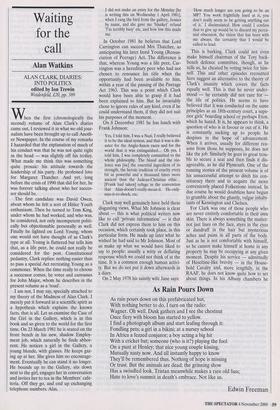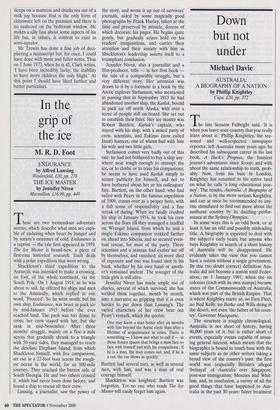Waiting for the call
Alan Watkins
ALAN CLARK, DIARIES: INTO POLITICS edited by Ion Trewin Weidenfeld, £20, pp. 389 When the first (chronologically the second) volume of Alan Clark's diaries came out, I reviewed it in what we old jour- nalists have been brought up to call Anoth- er Newspaper. In the course of my remarks I hazarded that the explanation of much of his conduct was that he was not quite right in the head — was slightly off his trolley. What made me think this was something quite prosaic: his attitude towards the leadership of his party. He professed love for Margaret Thatcher. And yet, long before the crisis of 1990 that did for her, he was forever talking about who her succes- sor should be.
The first candidate was David Owen, about whom he felt a sort of Hitler Youth enthusiasm. Then he turned to Tom King, under whom he had worked, and who was, he considered, not only incompetent politi- cally but objectionable personally as well. Finally he lighted on Lord Young, whom one would not have thought of as Clark's type at all. Young is flattered but tells him that, as a life peer, he could not really be considered for the post. Constitutional pedantry, Clark replies: nothing easier than to pass a special Act recreating Young as a commoner. When the time really to choose a successor comes, he votes and canvasses for John Major, whom he describes in the present volume as a 'toad'.
I am not, I may say, specially attached to my theory of the Madness of Alan Clark. I merely put it forward in a scientific spirit as a hypothesis which explains the known facts, that is all. Let us examine the Case of the Girl in the Gallery, which is in this book and so given to the world for the first time. On 23 March 1981 he is seated on the front bench in his new, shadow Employ- ment job, which naturally he finds abhor- rent. He notices a girl in the Gallery, a young blonde, with glasses. He keeps gaz- ing up at her. She gives him no encourage- ment. Eventually he can stand it no longer. He bounds up to the Gallery, sits down next to the girl, engages her in conversation and invites her to tea in the Members' cafe- teria. Off they go, and end up exchanging telephone numbers. Alas, I did not make an entry for the Monday [he is writing this on Wednesday 1 April 1981], when I rang the bird from the gallery, Jessica by name, and she gave me 'blanket' refusal 'I'm terribly busy' etc, and how low this made me.
In October 1981 he believes that Lord Carrington can succeed Mrs Thatcher, so anticipating his later Lord Young (Renun- ciation of Peerage) Act. The difference is that, whereas Young was a life peer, Car- rington was a hereditary peer who had not chosen to renounce his title when the opportunity had been available to him, within a year of the passing of the Peerage Act 1963. This was a point which Clark would have been able to grasp if it had been explained to him. But he invariably chose to ignore rules of any kind, even if he could understand them, if they did not suit his purposes of the moment.
On .8 December 1981 he has lunch with Frank Johnson: Yes, I told him, I was a Nazi, I really believed it to be the ideal system, and that it was a dis- aster for the Anglo-Saxon races and for the world that it was extinguished... Oh yes, I told him, I was completely committed to the whole philosophy. The blood and the vio- lence was [sic] the essential ingredient of its strength, the heroic tradition of cruelty every bit as powerful and a thousand times more ancient than the Judean-Christian ethic... [Frank had taken] refuge in the convention that Alan-doesn't-really-mean-it. He-only- says-it-to-shock, etc.
Clark may well genuinely have held these disgusting views. What Mr Johnson is clear about — this is what political writers now like to call 'private information' — is that Clark did not express them to him on this occasion, which certainly took place, in this particular form. He made up later what he wished he had said to Mr Johnson. Most of us make up what we would have liked to say to people: usually a witty or deflating response which we could not think of at the time. It is a common enough human activi- ty. But we do not put it down afterwards in a diary.
On 2 May 1978 his saintly wife Jane says: `How much longer are you going to be an MP? You work frightfully hard at it, you don't really seem to be getting anything out of it.' I dissimulated. How could I confess that to give up would be to discard my peren- nial obsession, the vision that has been with me always, the certainty that I would be called to lead.
This is barking. Clark could not even make himself chairman of the Tory back- bench defence committee, though, as he tells us, he cheated by voting twice for him- self. This and other episodes recounted here suggest an alternative to the theory of Clark's insanity which covers the facts equally well. This is that he never under- stood — he certainly did not care for the life of politics. He seems to have believed that it was conducted on the same principles as an 18th-century court, a supe- rior girls' boarding school or perhaps Eton, which he hated. It is, he appears to think, a question of who is in favour or out of it. He is constantly sucking up to people he despises in the hope of advancement. When it arrives, usually for different rea- sons from those he supposes, he does not like the job. Similarly he goes to great trou- ble to secure a seat and then finds it dis- agreeable, as he did Plymouth. One of the running stories of the present volume is of his unsuccessful attempt to ditch his con- stituency there and to acquire the more conveniently placed Folkestone instead. In due course he would doubtless have begun to grumble about the ghastly, vulgar inhabi- tants of Kensington and Chelsea.
For Clark was one of those people who are never entirely comfortable in their own skin. There is always something the matter: not just lines on the face, styes in the eyes or dandruff in the hair but mysterious aches and pains in all parts of the body. Just as he is not comfortable with himself, so he cannot make himself at home in any property he may be occupying at any given moment. Despite his service — admittedly of Heseltine-like brevity — in the House- hold Cavalry and, more lengthily, in the RAAF, he does not know quite how to set about things. In his Albany chambers he sleeps on a mattress and drinks tea out of a milk jug because that is the only form of chinaware left on the premises and there is no sashcord on the bedroom window. He makes a silly fuss about some aspects of his life but, in others, is content to exist in semi-squalor.
Mr Trewin has done a fine job of deci- phering a manuscript but, for once, I could have done with more and fuller notes. Thus on 1 June 1973, when he is 45, Clark writes, `I have been incredibly lucky, the inability to have more children the only blight.' At this point I should have liked further and better particulars.



























































































 Previous page
Previous page